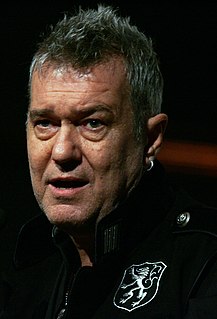A Quote by Henry A. Kissinger
Let me make my point about Vietnam. When the Nixon initiation came into office, there were 550,000 Americans in combat. And ending the war was not a question of turning off a television channel. And so, debating on how we got there and what judgments were made was not going to help us.
Related Quotes
The strange thing about my life is that I came to America at about the time when racial attitudes were changing. This was a big help to me. Also, the people who were most cruel to me when I first came to America were black Americans. They made absolute fun of the way I talked, the way I dressed. I couldn't dance. The people who were most kind and loving to me were white people. So what can one make of that? Perhaps it was a coincidence that all the people who found me strange were black and all the people who didn't were white.
One of the questions asked in that study was, How many Vietnamese casualties would you estimate that there were during the Vietnam war? The average response on the part of Americans today is about 100,000. The official figure is about two million. The actual figure is probably three to four million. The people who conducted the study raised an appropriate question: What would we think about German political culture if, when you asked people today how many Jews died in the Holocaust, they estimated about 300,000? What would that tell us about German political culture?
Most of us who were opposed to the war, especially in the early '60's - the war we were opposed to was the war on South Vietnam which destroyed South Vietnam's rural society. The South was devastated. But now anyone who opposed this atrocity is regarded as having defended North Vietnam. And that's part of the effort to present the war as if it were a war between South Vietnam and North Vietnam with the United States helping the South. Of course it's fabrication. But it's "official truth" now.
No liberal newspaper ever talked about the invasion of Vietnam; they talked about the defense of Vietnam. And then they were saying, "well, it's not going well." Ok, that make them liberal. It's like, it's if we were to say, that going back to, say, Nazi Germany, that Hitler's general staff was liberal after Stalingrad because they were criticizing his tactics: "It was a mistake to fight a two front war, we should've knocked off Englad first," or something.
Television and movies were our biggest teachers. When we came to the United States, the Vietnam War was just ratcheting up. And so the Asian faces that I saw on the news, they were the face of the enemy. Asian men, particularly, were either small, ineffective, or they were evil. And those messages were deeply, deeply embedded in me for many years.
My film isn't about Vietnam. It is Vietnam. It's what it was really like. It was crazy. And the way we made it was very much like the way the Americans were in Vietnam. We were in the jungle, there were too many of us, we had access to too much money, too much equipment and little by little we went insane.
When I was arrested opposing the war in Vietnam in 1965, as I said about 20 or 30% of people were opposed to the war. By 1968, more than half of Americans were opposed to the war. If you pull in Europeans, Canadians, people from around the Third World, the war was vastly unpopular. But even half of Americans by 1968 opposed the war.
The pictures that were coming from Vietnam were showing us what was really happening on the ground level. It was in contradiction to what our political and military leaders were telling us. They were straight forward documentary images. A powerful indictment of the war, of how cruel and unjust it was. When I finally decided what to do with my life, it was to follow in that tradition.
I found every single successful person I've ever spoken to had a turning point. The turning point was when they made a clear, specific unequivocal decision that they were going to achieve success. Some people make that decision at 15 and some people make it at 50, and most people never make it at all.
What we accomplished during World War Two is just amazing. We turned our country upside down. African Americans were demanding to be given combat missions. 10% of Americans moved in order to relocate for a war job. We as a country accomplished this heroic, nearly miraculous thing, and we have this legacy of policies and agency - how did they do it? How did they fund it? How did they organize it? It is actually an example that we can borrow from very productively to guide us.
I remember sitting in this pool hall with Stone and Chris and we watched - this really old, really classic pool hall - and we were sitting there and it was really rainy out and George Bush came on and started telling us about the [Gulf] war and that we were going and, and the whole thing, and there's part of that in it, when we talk about "I don't question our exsistence / I just question, our modern needs.
In the 1970s, we got a Labor government that put more emphasis on trade with Asia; the Vietnam war ended, and refugees were coming in. We were more part of Asia than America and the rest of the world. There was the proximity, for a start - all these countries and cultures just north of us. It just made sense that that's what we were part of.






























